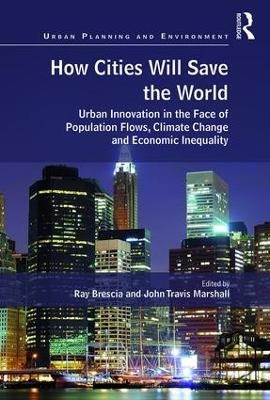
How Cities Will Save the World
Routledge (Verlag)
978-1-4724-5026-5 (ISBN)
Cities are frequently viewed as passive participants to state and national efforts to solve the toughest urban problems. But the evidence suggests otherwise. Cities are actively devising innovative policy solutions and they have the potential to do even more. In this volume, the authors examine current threats to communities across the U.S. and the globe. They draw on first-hand experience with, and accounts of, the crises already precipitated by climate change, population shifts, and economic inequality. This volume is distinguished, however, by its central objective of traveling beyond a description of problems and a discussion of their serious implications. Each of the thirteen chapters frame specific recommendations and guidance on the range of core capacities and interventions that 21st Century cities would be prudent to consider in mapping their immediate and future responses to these critical problems. How Cities Will Save the World brings together authors with frontline experience in the fields of city redevelopment, urban infrastructure, healthcare, planning, immigration, historic preservation, and local government administration. They not only offer their ground level view of threats caused by climate change, population shifts, and economic inequality, but they provide solution-driven narratives identifying promising innovations to help cities tackle this century’s greatest adversities.
Ray Brescia is Associate Professor and Director of the Government Law Center at Albany Law School, Albany, N.Y, USA, and John Travis Marshall is Assistant Professor and Associate Director of the Center for the Comparative Study of Metropolitan Growth at Georgia State University College of Law, Atlanta, GA, USA
Foreword (Arthur C. Nelson), Preface (Ray Brescia and John Travis Marshall), Introduction ( Raymond H. Brescia and John Travis Marshall), 1. Cities and the Financial Crisis (Ray Brescia), 2. Assessing Metropolitan Resiliency: Laying the Foundation for Urban Sustainability (John Travis Marshall), 3. Avoiding Atlantis: Protecting Urban Cultural Heritage from Disaster (Ryan Rowberry), 4. Moving to Safety? Opportunities to Reduce Vulnerability through Relocation and Resettlement Policy (Marla Nelson and Renia Ehrenfeucht), 5. Developing the Sustainable City: Curitiba, Brazil, as a Case Study (Hanna-Ruth Gustafsson and Elizabeth A. Kelly), 6. Exploring Options for Urban Sustainability in an Era of Scarce Water Resources: A Possible Ban on Lawns (Sarah B. Schindler), 7. Think Global, Pay Local (Ray Brescia), 8. Cities and Immigration Reform: National Policy from the Bottom Up (John DeStefano, Jr.), 9. Can Charter Schools Save Cities? Social Capital and Urban Public Education (John A. Lovett), 10. Cities Seeking Justice: Local Government Litigation in the Public Interest (Kathleen S. Morris), 11. Strategic Code Compliance Enforcement: A Prescription for Resilient Communities (Kermit J. Lind, J.D), 12. Renegotiating the Constituent’s Role in Urban Governance: Participatory Budgeting in New York City (Celina Su), 13. Financing Urban Transportation Infrastructure: Old and New Approaches for Funding Urban Regeneration and Resiliency: The Atlanta Example (M. Becht Neel and Julian Conrad Juergensmeyer)
| Erscheinungsdatum | 05.03.2016 |
|---|---|
| Reihe/Serie | Urban Planning and Environment |
| Verlagsort | London |
| Sprache | englisch |
| Maße | 156 x 234 mm |
| Gewicht | 566 g |
| Themenwelt | Naturwissenschaften ► Biologie ► Ökologie / Naturschutz |
| Naturwissenschaften ► Geowissenschaften ► Geografie / Kartografie | |
| Recht / Steuern ► EU / Internationales Recht | |
| Wirtschaft ► Volkswirtschaftslehre | |
| ISBN-10 | 1-4724-5026-4 / 1472450264 |
| ISBN-13 | 978-1-4724-5026-5 / 9781472450265 |
| Zustand | Neuware |
| Haben Sie eine Frage zum Produkt? |
aus dem Bereich


